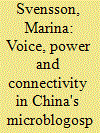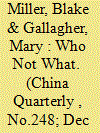|
|
|
Sort Order |
|
|
|
Items / Page
|
|
|
|
|
|
|
| Srl | Item |
| 1 |
ID:
077066


|
|
|
|
|
| Publication |
2007.
|
| Summary/Abstract |
There is a substantial moralistic streak in U.S. elite attitudes about war against states perceived as evil. Among opinion leaders, death penalty supporters were substantially more likely than opponents to support the 1991 Gulf War, condone the Iraqi death toll, and favor escalating the war to topple Saddam Hussein. These relationships persist after controlling for ideology, nationalism, and instrumental beliefs about force and thus probably result from individual differences in retributiveness and humanitarianism, moral values known to underlie death penalty attitudes. Foreign policy expertise moderated this effect only on the regime change issue, and then only moderately, suggesting that "moral punitiveness" might also influence the thinking of decision makers. President George H. W. Bush evidently felt real moral outrage during the crisis about Iraq's aggression, but he refrained from escalating the war to punish Saddam more severely for it.
|
|
|
|
|
|
|
|
|
|
|
|
|
|
|
|
| 2 |
ID:
135849


|
|
|
|
|
| Summary/Abstract |
Online platforms now provide a valuable medium for political socialization and mobilization. Recent events such as the Gezi Park protests, the Occupy Wall Street, or the anti-government protests in Iran demonstrate how effective social media can be in shaping an individual's political attitudes and actions. Traditional public opinion research does not acknowledge this emerging data source to its fullest extent. In this study, findings from the “Identifying Policy Opinion Shapers and Trends in Turkey” project, which has been collecting and exploring Twitter data to define how the online political debates are shaped in Turkey, are presented. Having identified over ten million active Turkish Twitter users and produced a social network graph of these users, this study identifies public opinion leadership in the Turkish online discussion space. The findings suggest that who these opinion leaders are may not follow the conventional expectations, but these leaders employ various tactics in managing their online presence and disseminating their ideas. This research endeavor as well as the findings suggests that engaging in cross-disciplinary research with scholars from different backgrounds can advance Turkish studies, in terms of both content and methodology. Most importantly, such interdisciplinary research can render significant leverage toward making Turkey more globally salient for scholarly debates.
|
|
|
|
|
|
|
|
|
|
|
|
|
|
|
|
| 3 |
ID:
133729


|
|
|
|
|
| Publication |
2014.
|
| Summary/Abstract |
This article addresses the issue of who has a voice on microblogs in China and what having a voice in the age of social media actually means. In theory, microblogs have a low threshold and are easy to use, thus enabling more Chinese citizens to articulate their concerns as well as paving the way for interactivity among different groups of people. In reality, however, not all citizens are as likely to use microblogs or be heard through them. Although microblogging practices have spread from the technology-savvy early adopters to broader groups in society, one should not assume that microblogs have helped bridge the information gap among China's ICT users, or empowered everybody in equal measure. This article discusses the demographics of microblog users, addressing diffusion patterns, number and range of followers, as well as topics discussed and how these are shaped by microbloggers of different socio-economic status. It makes use of and synthesizes existing surveys and previous studies in the field, while also building on this author's qualitative and ethnographic research on journalists and migrant workers. The article also addresses the 2013 crackdown on opinion leaders on microblogs and its implications for public debates and connectivity on social media.
|
|
|
|
|
|
|
|
|
|
|
|
|
|
|
|
| 4 |
ID:
183234


|
|
|
|
|
| Summary/Abstract |
In this paper, we examine how the Chinese state controls social media. While social media companies are responsible for censoring their platforms, they also selectively report certain users to the government. This article focuses on understanding the logic behind media platforms’ decisions to report users or content to the government. We find that content is less relevant than commonly thought. Information control efforts often focus on who is posting rather than on what they are posting. The state permits open discussion and debate on social media while controlling and managing influential social forces that may challenge the party-state's hegemonic position. We build on Schurmann's “ideology and organization,” emphasizing the Party's goals of embedding itself in all social structures and limiting the ability of non-Party individuals, networks or groups to carve out a separate space for leadership and social status. In the virtual public sphere, the Chinese Communist Party (CCP) continues to apply these principles to co-opt, repress and limit the reach of influential non-Party “thought leaders.” We find evidence to support this logic through qualitative and quantitative analysis of leaked censorship documents from a social media company and government documents on information control.
|
|
|
|
|
|
|
|
|
|
|
|
|
|
|
|
|
|
|
|
|